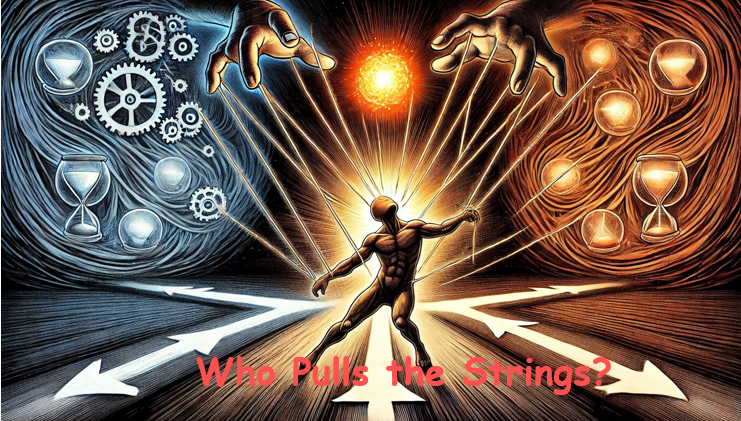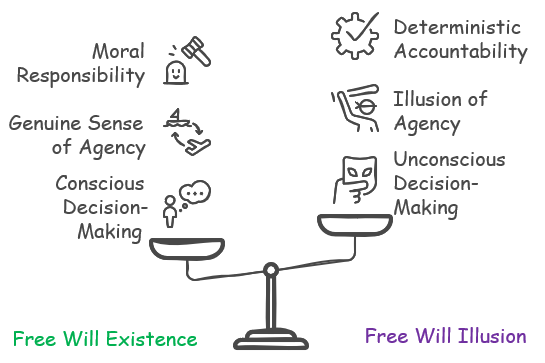|
|
||
|
Do we have free will? At first glance, you might think this question isn't worth asking. Surely, you believe you have free will – after all, you make decisions every day, from what to eat for breakfast to which career path to pursue. But upon second or third thought, you might start to realize that it's not such a simple question after all. The concept of free will – the idea that we have the ability to make choices independently of any external constraints – has been a subject of intense debate for centuries. While our intuition tells us that we are the authors of our own actions, deeper examination reveals a complex interplay of factors that challenge this assumption. Consider your last decision. Was it truly "free"? Or was it influenced by your past experiences, your current circumstances, your genetic predispositions, or even unconscious processes in your brain? The more we learn about neuroscience and psychology, the more we realize how much of our behavior is shaped by factors outside our conscious control. Moreover, if we live in a deterministic universe where every event is the inevitable consequence of prior events, how can our choices be truly "free"? Or if quantum indeterminacy plays a role at the neuronal level, does that randomness equate to freedom? These questions lead us down a rabbit hole of philosophical, scientific, and even theological considerations. The debate over free will touches on fundamental issues of morality, legal responsibility, and the nature of consciousness itself. It challenges our most basic assumptions about human agency and the concept of self.
As we delve deeper into this topic, we find that the seemingly straightforward question of whether we have free will opens up a world of complexity, forcing us to reconsider our understanding of choice, causality, and what it means to be human.
What is Free Will ?
Is there any neurological background behind Freewill ?Yes, there is significant neurological background that informs our understanding of free will, though it remains a topic of debate among neuroscientists, philosophers, and psychologists The neurological background of free will suggests that while we experience our decisions as freely made, they might be significantly shaped by unconscious processes, neural determinism, and pre-existing brain states. This raises questions about the extent to which we can claim true autonomy in our actions and decisions. However, the debate is ongoing, with some arguing that even if free will is influenced by neural processes, it doesn't entirely negate the experience of making choices.
Neuroscience of Decision-MakingThe neuroscience of decision-making unveils a sophisticated interplay of brain regions that underpin our ability to choose and act, shedding light on the mechanisms often linked to the concept of free will. At the forefront is the prefrontal cortex, particularly the dorsolateral prefrontal cortex, which serves as a command center for conscious deliberation, impulse control, and strategic planning—processes we commonly associate with intentional, self-directed behavior. Complementing this, the basal ganglia, a cluster of structures deep within the brain, orchestrate action selection and initiation, forming the bridge between thought and movement. Together, these regions highlight how decision-making emerges from a dynamic neural network, raising intriguing questions about the balance between deliberate choice and underlying biological processes in shaping what we perceive as free will.
The Role of the Unconscious MindThe exploration of the unconscious mind reveals a provocative dimension in the neuroscience of decision-making, challenging our intuitive sense of free will. In the 1980s, pioneering experiments by a neuroscientist demonstrated that the brain’s motor cortex activates to initiate an action well before a person registers conscious awareness of their decision to act, suggesting that unconscious processes may hold significant sway over what we perceive as deliberate choices. This discovery gave rise to the concept of the readiness potential—a detectable surge of brain activity that precedes voluntary movements—hinting that our neural machinery might be gearing up for decisions before they surface in our conscious mind. These findings weave a complex narrative, proposing that beneath the veneer of intentionality, the unconscious mind could be a silent architect of our actions, prompting a deeper reconsideration of autonomy and control.
Neural Networks and PredictabilityThe intricate dance of neural networks and predictability introduces a compelling layer to the debate surrounding free will, suggesting that our choices may be less spontaneous than they appear. Emerging theories like predictive coding propose that the brain functions as a proactive prediction engine, constantly anticipating environmental cues and refining its internal models based on incoming feedback. This framework implies that our decisions might be deeply rooted in prior experiences and ingrained neural patterns, casting doubt on the notion of entirely free, uninfluenced choice. Taking this further, the concept of neural determinism posits that every thought and action corresponds to specific, traceable neural processes, leading some neuroscientists to argue that free will could be an illusion—a mere byproduct of the brain’s inevitable activity. Together, these ideas paint a picture of a mind shaped by its own wiring and history, inviting us to question where true agency begins and predictability ends.
Role of Conscious AwarenessThe role of conscious awareness in decision-making unveils a fascinating tension between the seen and unseen layers of the mind, prompting a reevaluation of free will’s foundations. Mounting evidence suggests that a significant portion of our behavior is driven by unconscious processes, operating beneath the surface of our awareness. Rather than serving as the birthplace of our choices, the conscious mind may act more like a narrator, stepping in to rationalize and interpret actions that have already been initiated by deeper, hidden mechanisms. This perspective shifts the spotlight away from conscious intent as the sole arbiter of decision-making, proposing instead that it might function as a reflective overseer, weaving a coherent story from the threads of unconscious impulses. Such insights challenge the traditional view of autonomy, inviting us to consider the intricate partnership between conscious awareness and the silent currents that steer our behavior.
Neuroscience of AgencyThe neuroscience of agency delves into the brain’s remarkable ability to craft our sense of control, illuminating yet another facet of the free will puzzle. Key regions like the parietal cortex play a pivotal role in generating the sense of agency—the feeling that we are the authors of our actions—anchoring our belief in personal autonomy. However, when these areas falter, as seen in conditions like alien hand syndrome, the illusion of control unravels, with individuals perceiving their limbs acting independently, as if guided by an external force. Such disruptions highlight the fragility of our perceived command over our bodies and decisions, suggesting that the sense of agency may be a constructed experience rather than an absolute truth. This interplay between neural function and subjective ownership deepens the mystery of free will, revealing how intricately our brains weave the narrative of self-directed action.
Free Will: Fact or Fiction?Imagine a debate where people are arguing about whether we have free will or not. Some believe we make our own choices, while others think our actions are predetermined. This debate is about understanding what it truly means to be human. The question they're arguing about is a really important one: Do we have free will? Some people believe we're in control of our own lives, that we can make choices that change our future. Others think everything is already decided, that our brains and the world around us control what we do, even if it feels like we're choosing. This isn't just some boring philosophy talk. It's about understanding what it means to be human. If we don't have free will, does that change how we think about responsibility, or right and wrong? It's a big deal
Free Will: Not An IllusionThe concept of free will is central to our understanding of personal responsibility, moral accountability, and human dignity. Despite the complexities and challenges posed by neuroscience and philosophy, I argue that free will does indeed exist. I will present three aspects to support this claim: the role of conscious decision-making, the evidence from human experience, and the ethical implications of free will Conscious Decision-MakingFree will manifests in our conscious ability to deliberate, evaluate options, and make choices that reflect our personal values and desires.
Human Experience and IntuitionOur everyday experiences strongly suggest that we possess free will. The sense of agency we feel when making choices is a fundamental part of what it means to be human.
Ethical ImplicationsThe existence of free will is essential for moral responsibility. Without it, concepts like justice, praise, blame, and personal accountability would lose their meaning.
Free Will: A Convenient FictionWhile the notion of free will is deeply embedded in our understanding of human behavior and ethics, there are compelling reasons to question its existence. By examining the role of unconscious processes, the illusion of agency, and the deterministic nature of the brain, we can challenge the claim that free will is a genuine phenomenon. Conscious Decision-MakingWhat we perceive as conscious decision-making is often the result of unconscious processes that occur before we become aware of them.
Human Experience and IntuitionThe sense of agency we feel in our daily lives is an illusion created by the brain, designed to make us believe we have control over our actions.
Ethical ImplicationsMoral responsibility can be grounded in understanding the deterministic nature of our actions, rather than in the existence of free will.
Reference
YouTube
|
||


